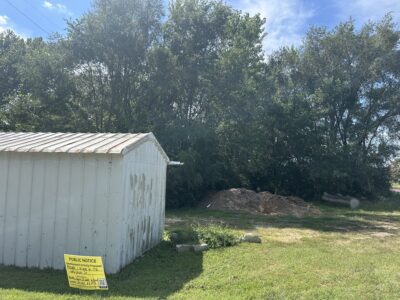KU law student organizing animal cruelty prosecution clinic
Katie Barnett has always been an animal lover.
At 16, she adopted her first dog, Carolina, an Australian shepherd, with her mom’s help. At 19, she adopted a rottweiler while on her own at college. Her passion for animals has grown since then, and she’s looking to make a difference in a bigger way.
Barnett, 30, a third-year law student at Kansas University, is organizing an animal cruelty prosecution clinic at the school. The clinical student will work with animal control, animal cruelty investigators at the Humane Society, police and prosecutors to make sure cases follow the right path and are prosecuted to the end. According to Barnett’s research, the clinic could be the first of its kind in the United States.
“This is the chance for me to give the animals a voice and a place in the justice system,” Barnett said.
Barnett and her husband, Anthony, started Game Dog Guardian, a local organization that rehabilitates pit bulls and helps find adoptive homes. She also lobbies for Best Friends Animal Society around Kansas. Adding a law clinic seemed like a natural addition to her repertoire when KU law professor William Westerbeke approached her about starting one.
“She has a long history in involvement in animal rights issues,” Westerbeke said.
Many law students do clinical work already, and he said designating one to specifically coordinate and keep track of the animal cases would be beneficial for all involved. It would save the Humane Society money and be terrific experience for the student, he said.
“It would guarantee, or hopefully enable, us to have those cases handled more efficiently or in a prompter way,” he said.
Barnett started researching how to put together the clinic two years ago, around the time when there were a couple high-profile animal cruelty cases in Lawrence. She had conversations with all involved parties to make sure the city and state agencies were even interested in the clinic.
“Everybody needed to be on board to work with the law school,” she said. “I spent a lot of time researching, seeing what everybody does.”
Barnett did ride-alongs with the police, went on checks with the animal cruelty investigators and went to court. She spoke with organizations around the country, such as Lewis & Clark Law School’s Center for Animal Law Studies and the Humane Society of the United States, who expressed interest in how the program developed.
This spring, Barnett has been gathering open and impending cases in Douglas County. She will develop a manual of how future students in the clinic should proceed.
“I’m doing a trial run to see how everything works,” she said. “I’m getting out all the kinks and really tailoring the position so everyone knows what to do. There’s never been a person to collect everything.”
The first student in the program will begin in fall 2011, and Westerbeke said other eastern Kansas counties have expressed interest in the program if it succeeds.
Barnett hopes it will, and getting everybody on board was a big part of that. She said she feels as though she’s a liaison between all the groups involved — the Humane Society, prosecutors, police and animal control.
“Everybody cares,” she said. “It’s just getting everyone on the same page.”







